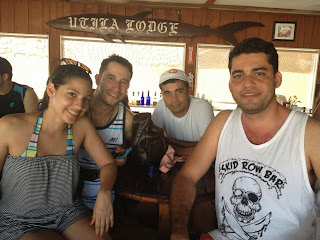The International
Rotary Club San Miguel from Tegucigalpa arrived in Utila for their annual beach
clean and tour of the local conservation organisations. During their visit, the Rotary club took a
trip to the Iguana Station and helped prepare food for the juvenile iguanas, they
conducted a beach clean at Pumpkin Hill beach, and also came to visit the Whale
Shark and Oceanic Research Center (WSORC) to learn about whale sharks. They enjoyed a presentation about the biology
of whale sharks, their habitats, the threats they face and their importance to
the local economy here in Utila. The day
ended with a snorkel tour and fish ID session under the Utila Lodge dock led
by WSORC’s volunteers to look at the natural aquarium and artificial reefs.
The majority of the members of the Rotary Club San Miguel
who arrived on Friday 13th September came from Tegucigalpa, were all
young enthusiastic environmentalists between 20 and 30 years old. The objective of their visit was to contribute
their time to helping the conservation activities of the environmental
organisations on the island, that are aimed towards conserving the natural environment
and preserving the biodiversity.
Their first encounter was with the Swamper Iguana (Ctenosaura bakeri), endemic to the
island of Utila and inhabits the mangrove swamps of Utila. At the Iguana Station the Rotary club group
were introduced to the conservation program that has been running for the last
20 years. They learnt about the captive
breeding program which is in place to help the wild populations of Swamper
iguanas recover from overexploitation, and they helped prepare the feed for the
juvenile iguanas that are kept in captivity until they are of a size where they
are more likely to survive in the wild.
The day continued with a beach clean at Pumpkin Hill, an
important site on the island of Utila as it is one of the more favoured beaches
where turtles come to lay their nests during nesting season. The Rotary club volunteers helped clear the
area that was covered in a variety of marine debris; plastic bottles, old flip
flops, tooth brushes, broken toys, and a whole host of mostly plastic
pollution. By clearing away all this
pollution, when the baby turtles hatch they are able to reach the sea without
having to clamber over all of these obstacles.
The afternoon was dedicated to learning about whale sharks
and their conservation status. To finish
off the day WSORC volunteers organised a snorkel tour underneath the Utila
Lodge dock. With over 40 species of fish
and 2 artificial reefs, it is like a natural aquarium and the WSORC volunteers
lead groups of snorkelers through the array of interesting species whilst
helping them to identify what they were seeing with underwater fish ID slates. This snorkel tour was appreciated by all, and
a successful way for the Rotary Club visitors to appreciate the underwater
world and understand the importance of coral reefs to Utila’s natural ecosystems.
Thank you Rotary Club San Miguel from Tegucigalpa for coming
to visit Utila and helping conserve the beautiful natural environment we have
here!
IN SPANISH
VOLUNTARIOS DEL ROTARY CLUB SAN MIGUEL
DE TEGUCIGALPA VISITA UTILA!
El Rotary Club San Miguel de Tegucigalpa
estuvo en la isla conociendo el trabajo que hacen las organizaciones
ambientales. Durante su excursión, ayudaron a alimentar a las iguanas en Iguana
Station, hicieron una limpieza en la playa Pumpkin Hill, aprendieron sobre el
tiburón ballena, sus hábitos, amenazas e importancia como especie y para
terminar el día disfrutaron de un tour de snorkel en el acuario natural del
Utila Lodge, liderado por WSORC.
La mayoría
de los miembros del Rotary club San Miguel que llegaron el viernes 13 de
septiembre a Utila, provenientes de Tegucigalpa, eran jóvenes entre los 20 y 30
años. Su objetivo era dedicar parte de su tiempo a ayudar en las actividades
que se realizan en la isla para conservar el medio ambiente y la biodiversidad,
así como conocer los diferentes campos de acción de cada una de las
organizaciones ambientales.
Su
primer encuentro fue con la iguana negra de cola espinosa (Ctenosaura bakeri), endémica de la isla
de Utila, que vive en un área de 82 kilómetros de bosques de manglar. En la
Estación Iguana conocieron el programa de conservación que llevan a cabo con
esta especie, tuvieron la oportunidad de alimentarlas e interactuar con su
crías.
El día continúo con una limpieza de
playa en Pumpkin Hill, la misma playa donde las tortugas llegan a anidar, y donde
BICA esta realizando los patrullajes nocturnos. Los voluntarios del Rotary Club
ayudaron a despejar el área, que estaba cubierta por plásticos y botellas, para
que en el momento de nacer las pequeñas tortugas puedan llegar al mar sin
obstáculos.
La tarde la dedicaron a aprender
sobre las particularidades del tiburón ballena, y para terminar el día WSORC
organizó un tour de snorkel debajo del muelle del Utila Lodge, donde se encuentra
un arrecife artificial que reúne a varias especies de peces. De esta manera
pudieron apreciar el mundo submarino y comprendieron la importancia que cumplen
los corales como base de estos ecosistemas.

















.jpg)


